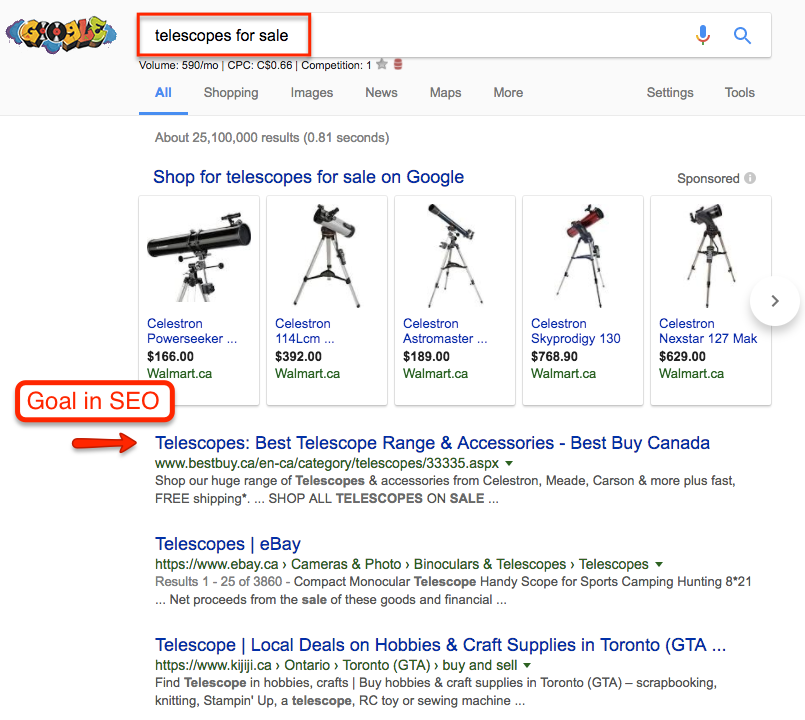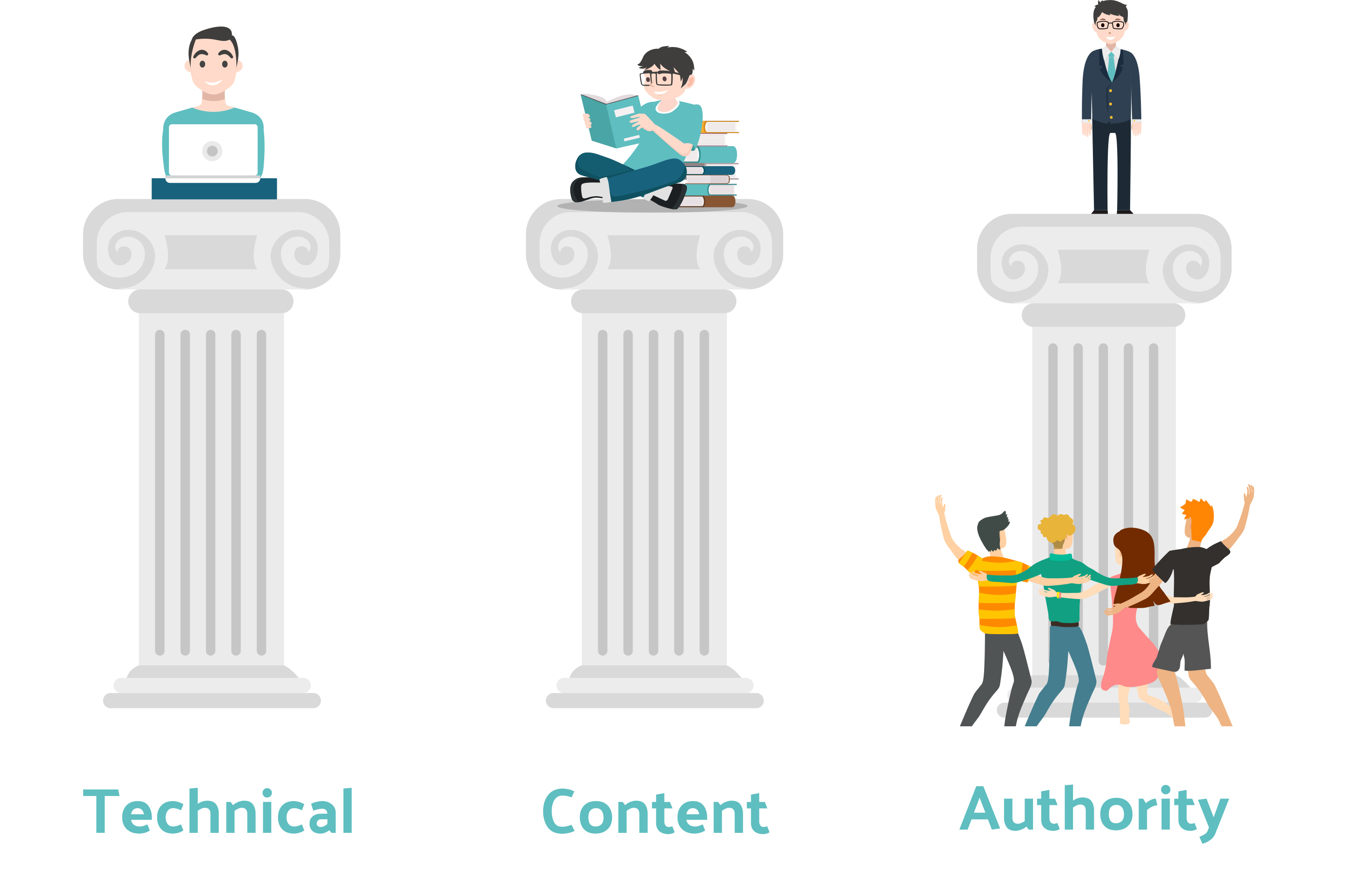
Getting Started:
Welcome to the first lesson of learning about SEO!
We’re here to chat about SEO which stands for Search Engine Optimization. Our job is to understand how search engines work and then help websites clearly communicate to them what they’re about so that they can rank in search engines like Google, Bing and others and gain relevant traffic.
Google processes about 40,000 – 70,000 searches per minute. Meaning there are at least about 1 billion searches being done every month at more than a trillion searches every year. In fact, 1 in 7 searches have never been searched before. That goes to show you how much the web is changing.
The amount of experience or skills needed:
You don’t need a lot of technical knowledge. Really, all you need is to have used Google or a search engine before. Knowledge of HTML is a big plus but not required. If you have beginner or intermediate skills in SEO, this is still worth taking a look at as the keyword research and content classifications could come in handy if you haven’t used a process like the one I’ll be showing you later.
By the end of this lesson, you’ll learn
- What SEO is and what it stands for
- Why SEO is useful or valuable to me or a business
- What the ultimate goal of SEO is
- How to think about SEO and the philosophy behind it
- How search engines work
- Three main pillars of SEO
Start of Lesson 1 – Introduction to SEO

What is SEO? How is SEO useful or necessary to myself or my business?
What is SEO? Well SEO stands for Search Engine Optimization. At the heart of it all, it’s about making your web pages optimized for search engines. More specifically, they will be visible at the top of a search results page.

Try this: go to Google.ca or Google.com search for “office chairs”
Ask yourself the following:
- How is the experience on the first organic listing (skip the Google ads)
- How is the user experience from the 1st organic listing vs. the 2nd, 3rd, or even 5th listing?
- Would you agree with Google on how these are listed or would you reorder them differently? If so, why?
SEO specialists have been moving towards this trend where we’re not only just looking at how to make our web pages easier for search engines to crawl and understand but deliver a superb user experience.
Now, why is SEO important? Well, you don’t have to pay for the traffic. That means you can save your hard earn dollars and use them for something else. Of course, your time is a cost factor but having an SEO campaign usually means it’ll be a machine that keeps driving traffic and increasing that return on investment.
Consider the following: how much would it cost you if you paid for the search engine traffic?
- Paying to get to the top of the search results page on Google for “basement waterproofing Toronto” would be $27.99/click and your time
- Earning or ranking at the top of the search results page through SEO efforts cost only your time
According to a study done by Moz in 2014 “On average, 71.33% of searches result in a page one organic click.” What this tells us is if you show up on the first page of Google that you have an excellent chance of getting organic traffic. More than that you earn your way to the top. Google rewards sites that have created a great experience and match the intent of the user. If you find your website at the top, you know you’re probably heading in the right direction of creating a valuable experience for the searcher.
How much traffic does SEO typically make up of most websites? Well in a study done by BrightEdge in 2014 they found that organic traffic or traffic from search engines make up 51% of total traffic.
How a Search Engine Works
Here’s a 3 min video of how a search engine works explained by Matt Cuts!
My way of explaining it
An analogy of a search engine could go something like this. Imagine the world before the internet. Suppose you need to get information on Bruce Lee. What do you do? You go to the library and ask the librarian that you need books on Bruce Lee. They access an extensive set of index cards that are labelled and ordered in a particular way. They find the location of these books and take you to them. You look through the books and see that it’s helpful, valuable, engaging and answers your question.
This simple example is how a search engine like Google or Bing essentially works. Except the librarian is sophisticated software and the information available isn’t just the books in the library it’s web pages on the internet. A search engine then looks at your request and has a particular set of rules, attributes, and processes that will help you get the information you want and make you feel satisfied.
However, in real life, the librarian hasn’t read every single book or be able to scan through every single one to help answer your question. A search engine does just that. It’s quite remarkable when you think about it.
Now, imagine you work on the Google search team, and you need to tell the search engine what to look for to return relevant results back to the searcher. How would you go about it? What kind of rules would you want to ensure people kept using your search engine? What cues would you take from the content that says “this is great content that is useful!” It’s a fun exercise to think about, and the difficulty of this job gives you a great sense of appreciation and depth. Google has been at it for 20+ years and is the king of search engines for most countries around the world. They didn’t get there by accident.
Three Pillars that Makeup SEO
When we think about the types of levers we can pull to improve our SEO we can bucket it into these three important pillars. They are Content, Technical, and Authority. Let’s talk about what these three represent as we’ll be discussing each of these in more in-depth later on.

Technical
Technical SEO is more about the back end of the code. It’s about can the crawlers easily read and interpret the information? If the crawler is blocked and unable to see the information then it can have huge consequences to your traffic and sales. As we go through the lessons, we’ll get more into how to identify these issues and resolve them.
Content
At the most basic level, it’s about the words on a page, images or anything that allows us to communicate to the user. Is what you have to say on the page valuable to the person reading it? Does it help solve a problem? Will it help answer a question? Could it match what they were expecting to see or read? We’ll get more into how we can improve our content and how to help us rank higher as a result but for now, just think of content as words on the page or how well we communicate.
Authority
The authority bucket is really around trust. What is everyone saying about our website or web page? Who is linking out to us? Are we getting good links from trusted sources like Forbes or the New York Times? Or are we getting shady links from sites that provide a bad user experience and may even pose a threat to anyone going to their site? We’ll look at some different strategies you can use to build trust and authority and improve your rankings overall.